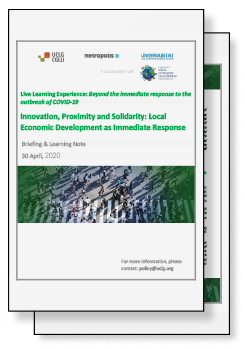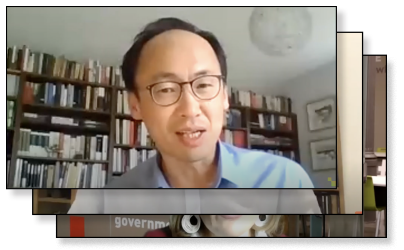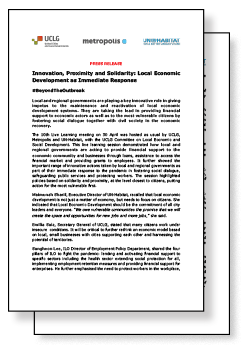Local
Economic
Development
Under-Secretary-General of the United Nations and Executive Director of UN-Habitat
UCLG Secretary General
Under-Secretary-General of the United Nations and Executive Director of UN-Habitat
UCLG Secretary General
Under-Secretary-General of the United Nations and Executive Director of UN-Habitat
UCLG Secretary General

Context

The global economic impact caused by the COVID-19 crisis is still unpredictable. Unlike other economic crises, we find ourselves in a unique situation of paralysis both in the supply and in the demand for goods and services at a global scale. Traditional tools to boost the economy used in previous recessions – be it fiscal measures or infrastructure development –either have little impact or cannot be put in place due to health restrictions.
According to the International Labor Organization, concerns come both for a short terms perspective – it is estimated that COVID-19 will push 49 million people into extreme poverty in 2020 – and from a long-term perspective. Much of the economic losses that are happening due to health restrictions are likely not to be recovered. This is particularly true for specific sectors, such as tourism or air travel but also in terms of employment. In the US, for instance, about 40 million people have lost their jobs due to COVID-19 and it is estimated that about 42% of those will result in permanent job loss. This is an unprecedented economic challenge, that will require more than well-known fiscal and economic tools, but a complete shift in our economic structure.
130M
305M
Challenges
The impact on employment and economic activity manifests itself at the local level, so while policies should come from a national level, local governments are at the forefront of the fight to help promote economic activity and alleviate the impact caused by the economic crisis. The main challenge is to find a balance between promoting economic activity – guaranteeing citizens’ livelihood in the short and long term – and enabling a safe, healthy environment. Governments are facing enormous pression, particularly from sectors such as hospitality and tourism. Another challenge refers to gender, as 42% of women worldwide work in the informal sector, making them more vulnerable to economic downturns. In that sense, local governments face the challenge of preventing the income gender gap to become wider.
Needs
Local Governments need to face this economic challenge having in mind the emergency phase, the early recovery phase and the “new normal” phase. First, they need to ensure basic goods and services for those who are unemployed, establishing emergency policies in terms of housing, food security and emergency funds to particularly impacted sectors. Second, cities must coordinate with multiple stakeholders to develop integrated measures that prioritize the most impacted sectors – such as hospitality – and most vulnerable communities – such as women, children and the elderly. Finally, as we start to build a “new normal”, cities need to rethink production and consumption models, establishing more diversified, sustainable and resilient models. Again, this is particularly true for economies largely based on tourism or in places where most citizens work in the informal sector.
Responses
Bogotá is offering cash transfers to the most vulnerable, as well as the reactivation of the economic system to guarantee employment during and after the health crisis
Gauteng is providing access to finance to SMEs through the Gauteng SME Partnership Fund
Sheffield is working on capacity building to build the community’s resilience, protecting apprenticeships and designing interventions targeted at the unemployed
Responses
Bogotá is offering cash transfers for the most vulnerable people, as well as the reactivation of the economic system to guarantee employment in the current and subsequent periods
Gauteng is providing accessing to finance to SMEs through the Gauteng SME Partnership Fund
Sheffield is working on capacity building to build the community’s resilience, protecting apprenticeships and designing interventions to help the unemployed learn new skills
Key Takeaways
- The pandemic and the resulting health crisis will have a long-lasting economic impact. Cities must work on emergency plans while designing long-term solutions to support the livelihood of all citizens, particularly the most vulnerable.
- A global crisis of such magnitude requires a truly transformative shift in the economic model at the local level. Recovery plans should be inclusive and sustainable as governments should focus on building more resilient, adaptable communities.
- The rural-urban relation is changing, the appreciation of farming versus the sacrifice of rural land for urbanization.
- Diversification should be taken into account, particularly for economies that rely heavily on a particular sector. Unlocking new economic activities and capacity building programs will support local efforts to build more resilient communities.
- Community needs should be at the center of recovery plans. To that end, social dialogue and civic participation will be more important than ever to build effective and inclusive recovery policies.
Beyond
The Outbreak
The need for an economic recovery creates an opportunity to apply a diversity of alternative economic models and practices, such as the green and circular economy, as well as social and technological solutions to help stabilize the supply chain. Solutions should be based on the transition to a healthier and more resource-efficient economy, on sustainable consumption and production patterns anchored in local value chains, and should foster entrepreneurship and social innovation. The magnitude of the economic impact of COVID-19 has also shed light on inclusive economic policies that have long been discussed, including the idea of a Universal Basic Income. As an emergency measure, many countries are using cash transfers to guarantee the livelihoods of those who lost their source of income and help keep the economic engine moving, and with the outcomes of the pandemic still unclear, policies such as the UBI could well be the norm in the coming years.

Building
Back Better
The UCLG Decalogue

Resources

For further information on the topic of Local Economic Development and its impact on cities and regions, please refer to the related resources included below.
- ILO Monitor: COVID-19 and the world of work. Third edition
- Key messages on LED from Local Governments
- Tourism and its impact on cultural life in cities, the UCLG Culture Committee report, 2019




